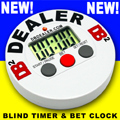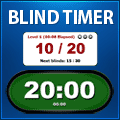|
|
Poker Tournament Structures
Run a poker tournament
Director-Training.com There are several different structures that may be used for poker tournaments. Most of the tournaments that you see on television, such as the WSOP, use a freeze-out structure - you receive 10,000 in chips and are eliminated from the tournament as soon as you lose all your chips. You cannot rebuy or add-on more chips, once you lose your chips, you're gone! This type of structure is fine for professionals but may be a bit too harsh for a friendly home poker tournament. The most common structure for a home tournament would be a rebuy tournament with one rebuy or unlimited rebuys. The reason for rebuys is to allow players to continue playing even if they bust out in the early part of the game. Most home games are between friends, family, or co-workers and the host would like to see the guests have a good time. That's a little hard to do if your quest goes broke in the first five minutes of your six hour poker night! For this reason, rebuys are usually allowed in most home tournaments. Keep in mind that your tournament will be affected by whichever rebuy method you choose to use. Your players will play conservatively (tight) if they know that they cannot rebuy and will play riskier (looser) if they know that they can rebuy if they go broke. You can expect inexperienced players to play particularly poorly when given the opportunity to rebuy. Add-ons are a good way to increase the size of the purse (the money to be won) and help to even out the playing field. Purchasing an add-on allows a player to buy an additional amount of chips to add to their existing stack of chips. For instance, a player that is below 500 chips may be allowed to add-on an additional 500 chips. I recommend that you do not use add-ons for your first few tournaments - keep it simple at first. The payout structure will have an effect on your game. If you only pay out the winner, players will try to win at all costs. If you pay out the top 5 finishers, the players will still try to win, but might also settle for third or fourth place. They might play a certain style until they get to the final five players and then totally change their strategy. Make sure you have an established rule for dealing with players who tie for a money position. Poker Tournament Blinds HPT suggested poker blindsCalculate a blinds schedule WSOP poker blinds Misc poker blinds Create-a-Blind You will have to decide how to seat and move players between tables. See my Seating Players and Moving Players pages for information on those subjects. Most tournaments balance players (move them) between tables but a shotgun tournament means that each table will play internally to itself until there is one player remaining at that table. No players are moved from table to table. The winner of each table is then seated to form the final table. The obvious advantage to using a shotgun format is that you don't have to worry about balancing players between tables - no one gets moved until you seat the final table. A disadvantage is that one table might have a winner after two hours of play while another table takes four hours. Another disadvantage is that you might have the three or four best players all sitting at the same table - only one of those players will advance. The dollar amount of the buyin and the value of the chips issued to start the tournament is totally at your discretion. You can charge a $10 buyin and issue 10,000 chips to each player or you can charge a $100 buyin and issue 500 chips to each player. Just make sure that each player pays the same amount and receives the same amount of chips. If you are new at this, keep your buyin low, say $10 or $20, and use all the suggested chip amounts and blinds schedules for the suggested 1000 chip tournament found on this site. The Quick Start page is a brief summary of my suggested tournament structure. You can play two quick tourneys rather than one long tourney. Simply set your blinds so that each tournament will end in about two hours. Keep in mind that the shorter the tournament - the more luck will play a large role. A long tourney will allow the best players to rise to the top but a shorter tourney will result in more of a crapshoot with lucky players having a better chance. Does the same player win every tournament? Put a bounty on his head! A bounty is paid to the player who eliminates a "Wanted" player from the game. Take $20 or $100 from the overall purse and put a bounty on the head of the player who won your previous tournament. This will make it more difficult for that player to win again because everyone will be trying to eliminate him for the bounty money! You can spread your payout money around even more by awarding a bounty for each player eliminated from the tournament. Simply give each player who eliminates another player $10. You will have to decide what you want to do with players who have busted out of your tournament. You can allow them to stay and watch the remaining players finish the tournament or you can force busted out players to leave. Whatever you decide, let it be known that as Tournament Director, your main efforts must be directed towards the smooth running of your poker tournament and that you cannot spend much time, if any, on busted out players. You can offer rebuys so that players who bust out early can re-enter the tournament. You can offer a cash game on the side but you will have to use different poker chips than what you are using in your tournament otherwise you will have scammers who pocket a T100 poker chip from your tournament and use that same chip as a $100 chip in your cash game - when you are finished your cash game, you will find out that you have been scammed for $100. You can also offer side games of checkers, Chinese Poker, or card games other than poker - even a heads-up poker match.
Types of Poker TournamentsFreeze-outYou are eliminated from the tournament when you lose all your chips. You cannot rebuy. RebuyYou can buy more chips when you go broke or when you are close to going broke. Some tournaments allow only one rebuy while some tournaments allow multiple rebuys. The rebuy period only lasts for the first several blinds levels. ShootoutEach table plays down to one winner. All the table winners are then seated at the final table. Free RollA tournament that costs nothing to enter. There is no buyin fee. Guaranteed PayoutA tournament with a guaranteed minimum payout. Mixed (HORSE, HOSE, etc.)A tournament where different variations of poker are played. Hold'em is played for the first blinds level, then Omaha is played for the next blinds level, then Stud is played for the next blinds level, etc.. Heads-upA tournament where all matches are one-vs-one. There is a playoff bracket system where the winners keep advancing until there is one final winner. SatelliteA tournament that will win you a seat at a higher buyin tournament. |
Online Poker Guide
Hand Converter
Holdem strategy
Freeroll tournaments
Poker calculator
Online poker
Poker rooms
> poker pokeren
> iDeal poker
> online casino
> iDeal casino
> casino casinos
> casino bonus
Get Bonus code Titan Poker, and full tilt poker referral code or max bonus to the full tilt referral code. Best ultimate bet referral code sign up bonus doyles room promo code or poker host bonus code























